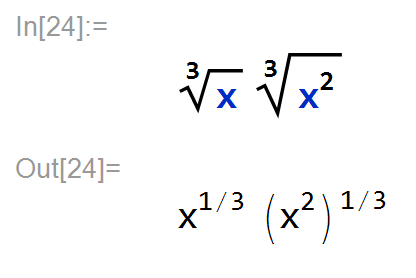I used Basic Math Assistant to calculate the product of two radicals:
In[24]:= Power[x, (3)^-1] Power[x^2, (3)^-1]
Out[24]= x^(1/3) (x^2)^(1/3)

It's obvious that the result must be simplified to x. Unfortunately, Mma didn't provide such simplification...
Then, I calculated the same product as the product of two powers:
In[25]:= x^(2/3)*x^(1/3)
Out[25]= x
The result is that it must be expected.
Why the pallet application produces such an issue?